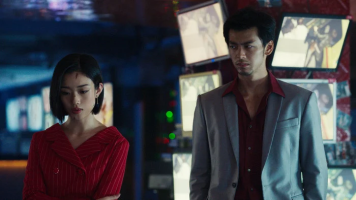Official Review
The main plot revolves around Ichiban Kasuga, a low-ranking yakuza member who takes the fall for a crime he didn't commit. After serving a lengthy prison sentence, he emerges to find his world turned upside down. This setup closely mirrors the game's narrative, providing a solid foundation for the series.
Where the show diverges is in its pacing and depth of exploration into the criminal underworld. While the games often balance serious crime drama with quirky side quests and mini-games, the TV adaptation maintains a more consistent tone, delving deeper into the political machinations and personal struggles of its characters.
The themes of redemption, family (both blood and chosen), and the struggle between tradition and modernity in Japanese society are prominently featured. These align closely with the franchise's core themes but are presented with a nuance that the episodic format allows.
Character Development
Character development is where "Like a Dragon: Yakuza" truly shines. Ichiban Kasuga, the protagonist, is brought to life with a depth that even surpasses his video game counterpart. His journey from a naive, loyal foot soldier to a man grappling with the harsh realities of the criminal world is portrayed with nuance and emotional resonance.
Supporting characters are given ample screen time to develop their backstories and motivations. Characters like Masato Arakawa and Yu Nanba, who play significant roles in the game, are fleshed out even further. The show takes the time to explore their personal struggles, making them more than just plot devices or sidekicks.
One of the most impressive aspects is how the show handles its antagonists. Rather than presenting them as one-dimensional villains, it explores their motivations and the circumstances that led them to their current paths. This complexity adds layers to the narrative and makes the conflicts more engaging.
The character arcs are well-paced throughout the series, allowing for organic growth and change. This measured approach to character development helps the audience form strong connections with the cast, making the emotional highs and lows of the story more impactful.
Cultural Representation
"Like a Dragon: Yakuza" offers a nuanced portrayal of Japanese culture, particularly focusing on the intersection of traditional values and modern society. The show doesn't shy away from depicting the less glamorous aspects of urban Japanese life, including the struggles of the working class and the societal pressures faced by individuals.
The representation of yakuza culture is particularly noteworthy. While it doesn't completely eschew some of the romanticized notions of honor among thieves, it also doesn't glorify the criminal lifestyle. Instead, it presents a balanced view, showing both the codes of honor that govern yakuza life and the brutal realities of crime and violence.
The show does an excellent job of incorporating Japanese cultural elements, from the importance of hierarchy and respect in social interactions to the role of tradition in modern business practices. It also touches on issues relevant to contemporary Japan, such as an aging population and economic challenges, providing context for the characters' motivations and actions.
While the show occasionally leans into some cultural stereotypes, particularly in its portrayal of yakuza rituals and hierarchies, it generally offers an authentic perspective that feels true to the spirit of modern Japan while acknowledging its complex relationship with tradition and change.
Comparison to Franchise
As an adaptation of the beloved video game series, "Like a Dragon: Yakuza" faces the challenge of translating an interactive medium into a passive viewing experience. In many ways, it succeeds admirably.
The show captures the essence of the franchise's storytelling, maintaining the core themes of honor, loyalty, and the gray areas of morality in the criminal underworld. The complex plot twists and turns that fans of the games have come to expect are present, albeit adapted to suit the television format.
Where the show diverges is in its tone. The games are known for their unique blend of serious drama and over-the-top humor, often featuring absurd side quests and mini-games. The TV adaptation, while not entirely devoid of humor, takes a more consistently serious approach. This may disappoint some fans who enjoy the games' quirkier elements, but it allows for a more focused and intense narrative.
The action sequences in the show are well-choreographed and intense, capturing the spirit of the games' combat without resorting to unrealistic video game physics. This grounded approach to action helps maintain the show's overall tone and realism.
One area where the show particularly excels is in its exploration of the wider yakuza world. While the games often focus on a specific city or region, the TV series has the freedom to explore multiple locations and delve deeper into the interconnected nature of various criminal organizations.
Overall Impression
Like a Dragon: Yakuza is a compelling crime drama that successfully translates the spirit of the video game franchise to the small screen. Its strengths lie in its character development, nuanced portrayal of Japanese culture, and ability to weave complex narratives that keep viewers engaged.
The show's commitment to exploring the moral ambiguities of its characters and the yakuza world provides depth and authenticity to the storytelling. The production values are high, with convincing performances, stylish direction, and a moody soundtrack that captures the atmosphere of the games.
However, fans of the video game series might find the lack of the games' signature humor and quirky side activities disappointing. The more serious tone, while allowing for deeper character exploration, does lose some of the charm that makes the games unique.
For newcomers to the franchise, "Like a Dragon: Yakuza" serves as an excellent entry point. It provides a gripping narrative and rich character development without requiring prior knowledge of the games. For long-time fans, while some elements may feel different, the core essence of what makes the Yakuza series special is very much present.
In conclusion, "Like a Dragon: Yakuza" is a well-crafted crime drama that offers a unique window into the world of Japanese organized crime. Its strong character work, cultural authenticity, and compelling storylines make it a worthwhile watch for both fans of the franchise and newcomers alike. Despite some departures from the source material, it stands as a solid adaptation that captures the spirit of the Yakuza series while carving out its own identity as a television drama.



